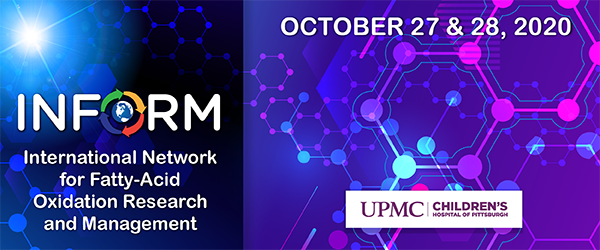
Poster Award: Johannes Odendaal

The scientific organizing committee for the annual INFORM meeting
Awarded the poster entitled: Semi-stochastic and patientmodels of human mFAO suggest CoASH oversequestration as possible cause of hypoglycaemia in MCADD, for an Honorable Mention Award.
This will provide Johannes a live chat feature on his poster one hour prior and post on October 27th & 28th 2020 at the INFORM meeting
Abstract:
Ultragenyx / Honorable Mention Poster Award
Title: A stochastic model of mitochondrial ß-oxidation suggests a role for free mitochondrial coenzyme A depletion in MCADD disease aetiology
Authors: Johannes C.W. Odendaal1, MSc; Anne-Claire M.F. Martines1, PhD; Fentaw A. Yazew1, PhD; Karen van Eunen1, PhD; Terry G.J. Derks1,2,4, MD PhD; Barbara M. Bakker1,PhD
Affiliations:
1-Laboratory of Paediatrics, Centre of Liver, Digestive and Metabolic Diseases, University of Groningen, Groningen, University Medical Centre Groningen, Groningen, The Netherlands,
2-Department of Paediatrics, University Medical Centre Groningen, University of Groningen, Groningen, The Netherlands
3-Department of Laboratory Medicine, University of Groningen, University Medical Centre Groningen, The Netherlands
4-Section of Metabolic Diseases, Beatrix Children’s Hospital, University Medical Centre of Groningen, University of Groningen.
Correspondence: Barbara M. Bakker (b.m.bakker01@umcg.nl)
Background: Identical medium-chain acyl-CoA dehydrogenase (MCAD) deficiencies (MCADD) can cause a deadly hypoglycaemia in some, while others are asymptomatic all their lives. Downstream biochemical factors must therefore account for clinical heterogeneity. In silico work from our group has shown that high substrate concentrations in conjunction with a loss of MCAD might lead to the accumulation of pathway intermediates in the mitochondrial ß-oxidation (mFAO) and the depletion of free mitochondrial coenzyme A (CoASH). Depletion of this integral cofactor of mitochondrial metabolism could reduce gluconeogenic capacity by limiting ATP and NADH production and precipitate in a hypoglycaemia.
Methods: We evaluated the priors of this hypothesis with a stochastic model of human mFAO. Parameter sets were pseudo-randomly picked from literature-derived distributions. This yielded a probabilistic, instead of a deterministic, outcome. To explore the role of MCADD in CoASH depletion, MCADD and wild-type models were generated, as well as models with and without an acyl-CoA thioesterase (ACOT), which liberates CoASH from their acylated form.
Results: Stochastic simulations show that MCADD tends to yield lower fluxes and lower steady-state mitochondrial CoASH. The addition of ACOT does not increase the steadystate CoASH, but it does substantially increase NADH production at low substrate concentrations, while the same is not seen in high substrate.
Discussion: The increased tendency for lower CoASH in the MCADD stochastic model points towards higher degrees of CoASH sequestration in MCADD. Moreover, increased mFAO flux in the presence of ACOT only at low substrate concentrations suggests that mFAO flux switches from a demand- to a supply-driven pathway as substrate increases. If the depletion of CoASH were shown to underly the hypoglycaemia, this would suggest reactions higher up in the ß-oxidation spiral as sites to protect an MCADD patient from pathway intermediates build-up.
More news
-
15 September 2025
Successful visit to the UG by Rector of Institut Teknologi Bandung
